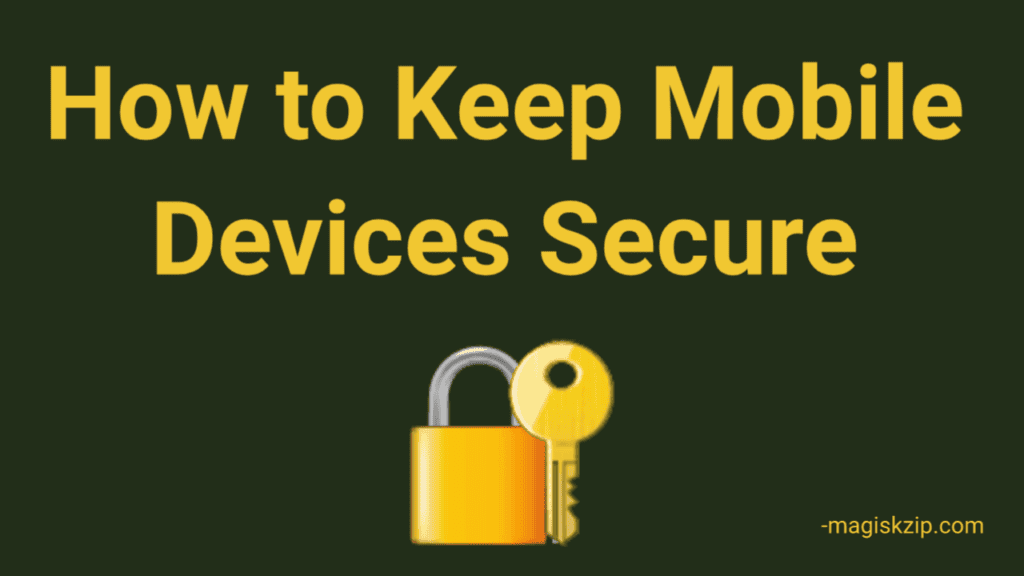Are you worried about keeping your mobile device safe from cyber threats? You’ve come to the right place. In this article, we will provide you with practical tips and advice to protect your device and personal information. From using strong passwords to being cautious of public Wi-Fi, we’ll cover it all.
We use them for everything from communication and entertainment to banking and shopping. However, as we become increasingly reliant on these devices, they also become a prime target for cybercriminals. Here, we will show you how to safeguard your device and keep your personal information secure.

Table of Contents
Use Strong Passwords and Enable Two-Factor Authentication
One of the most basic, yet effective, ways to keep your mobile device secure is to use strong passwords and enable two-factor authentication. A strong password is one that is at least eight characters long and includes a combination of letters, numbers, and symbols. Two-factor authentication is an additional security measure that requires a second form of verification, such as a fingerprint or a code sent to your phone, before granting access to your device.
Keep Your Software Up-to-Date
Keeping your mobile device’s software up-to-date is one of the most important things you can do to protect it from cyber threats. Software updates often include security patches that fix known vulnerabilities in the operating system. By not updating your device, you’re leaving it open to potential attacks.
Be Careful What You Download
Another way to protect your mobile device from cyber threats is to be careful what you download. Only download apps and files from trusted sources, such as the official app store for your device. Be wary of apps that ask for excessive permissions, or seem too good to be true.
Use a Mobile Security App
Using a mobile security app can help protect your device from cyber threats. These apps can scan your device for malware and alert you to any potential threats. They can also help you locate your device if it’s lost or stolen. Some apps even have features that allow you to remotely wipe your device’s data if it’s been compromised.
Be Careful of Public Wi-Fi
Using public Wi-Fi can be risky for your mobile device. Public networks are often unsecured, which means that anyone can connect to them. This can make it easy for cybercriminals to steal your personal information. To protect yourself, avoid using public Wi-Fi networks whenever possible. If you must use one, make sure to connect to a VPN (Virtual Private Network) first.
Use a Screen Lock
Using a screen lock is an easy way to protect your mobile device from unauthorized access. A screen lock can be a passcode, a pattern, or even a fingerprint. This will help prevent someone from accessing your device if you lose it or it gets stolen.
Be Careful of Phishing Scams
Phishing scams are attempts by hackers to trick you into giving away your personal information. These scams can come in the form of emails, text messages, or phone calls. To protect yourself from phishing scams, be wary of unsolicited messages and never click on links or enter personal information unless you are sure of the sender’s identity.
Conclusion: Mobile devices are an essential part of our lives, but they also come with their own set of risks. By following the tips outlined in this article, you can help protect your device from cyber threats. Remember to use strong passwords and enable two-factor authentication, keep your software up-to-date, be careful what you download, use a mobile security app, be careful of public Wi-Fi, use a firewall, use encryption, and be careful of phishing scams. By taking these steps, you can help ensure the security and privacy of your mobile device. Don’t forget to check out the FAQ section for more information and if you have any other questions.
FAQs
Here are some frequently asking questions and answers:
Two-factor authentication (2FA) is an additional layer of security that requires a second form of verification, such as a fingerprint or a code sent to your phone, before granting access to your device. This helps to prevent unauthorized access to your device, even if someone has your password.
Public Wi-Fi networks can be risky because they are often unsecured, which means that anyone can connect to them. This can make it easy for cybercriminals to steal your personal information. To protect yourself, avoid using public Wi-Fi networks whenever possible. If you must use one, make sure to connect to a VPN (Virtual Private Network) first.
The best way to tell if an app is safe to download is to only download apps from trusted sources, such as the official app store for your device. Be wary of apps that ask for excessive permissions or seem too good to be true. Also, you can read reviews and check the ratings of the app before you download it.
Conclusion
Keeping mobile devices secure and protected from cyber threats requires a combination of proactive measures. By following these seven tips, you can take control of your digital security and safeguard your personal information from potential cyber-attacks. These include using strong passwords, updating software regularly, avoiding public Wi-Fi, being cautious of phishing scams, using antivirus software, limiting the amount of personal information shared online, and backing up important data. By taking these steps, you can rest assured that your mobile devices are secure and protected from potential cyber threats.
